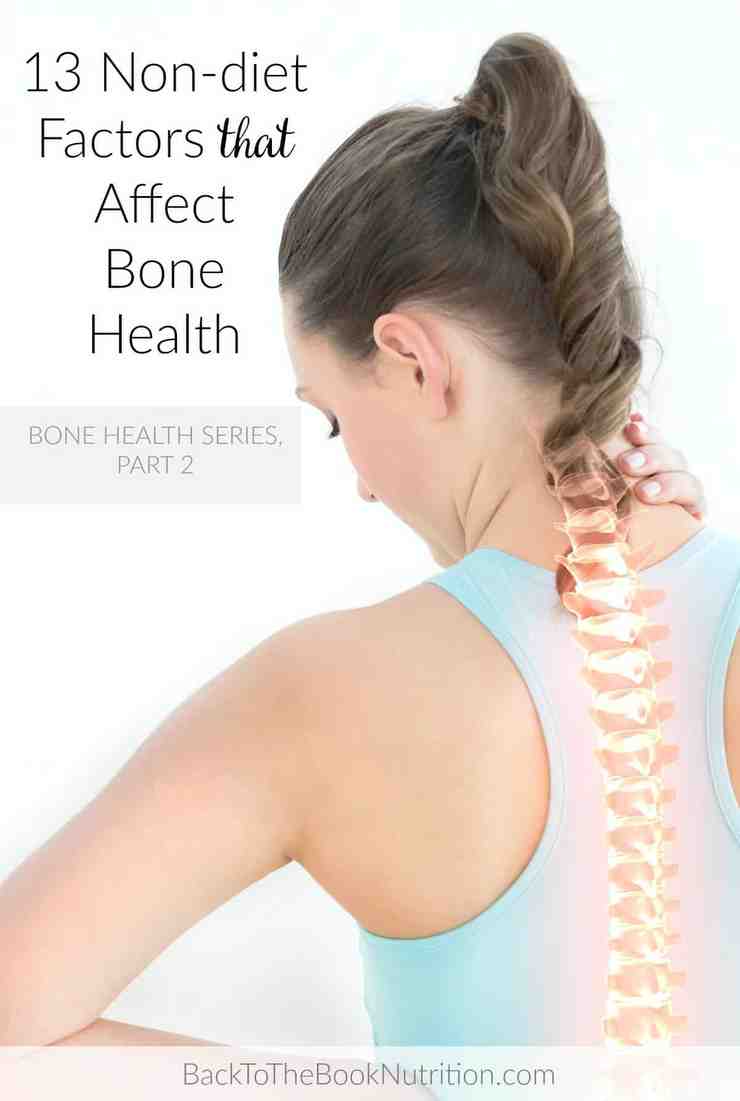13 lifestyle factors that affect bone health, and practical tips to help you optimize them for stronger bones throughout your life!

Note from Dena: This guest post was written by Keri Carpenter, Dietetic Intern, as part of a research partnership between Back To The Book Nutrition and post-graduate nutrition students from the University of Houston.
In Part 1 we discussed 7 key nutrients that protect your bones. Today we will discuss non-dietary factors that impact bone health and empower you with steps to take today for stronger, healthier bones!
13 (Non-diet) Lifestyle Factors that Affect Bone Health
1. Female hormones, ovulation, and peri/menopause
As women, we are told that just being female puts us at risk for osteoporosis and poorer bone health than our male counterparts! About 80% of all diagnosed osteoporosis patients are female. But men, you still need to be aware of bone health! (10)
Estrogen and progesterone serve many roles in the body, including promotion of bone growth (especially during puberty) and prevention of bone loss (especially in our thirties and beyond). Studies have shown that women with healthy hormone levels and who ovulate regularly have higher bone densities than women with hormonal imbalances and infrequent ovulation.
Unfortunately, the sharp decline in estrogen and progesterone during perimenopause and menopause accelerates muscle loss (“sarcopenia”) bone loss. Women who overtrain or eat too few calories may experience a deficiency in estrogen at an earlier age (very light or nonexistent periods are one sign of this), which causes lower bone mass later in life. (1, 11)
Learn more about tracking your monthly hormone patterns and ovulation here!
2. Age
Our bones constantly change throughout our life. In our adolescence, bones continue to grow and develop and, by our early 20s, we reach our peak bone mass. As we age, it’s natural for our bones and the joints in between them to experience losses. But eating a bone healthy diet and optimizing the non-diet factors in this post can help minimize bone loss and reduce risk for osteopenia and osteoporosis. (1)
3. Physical activity
We are all aware that regular physical activity can do wonders for health and disease prevention. But did you know that physical activity is also one of the best ways to preserve bone mass? When there is force placed on the bone, the body responds by building more bone!
While strength training is important for increasing and preserving bone mass, low impact activities like walking are also helpful since they place weight on the bone and promote balance and build muscle, both of which reduce the risk of falls and bone injuries.
How Much Exercise Is Too Much?
Moderate exercise is great for the bones, but studies show that in overtraining, especially in combination with poor nutrient intake, can lead to bone loss. If you enjoy running, Cross Fit, or High Intensity Interval Training (HIIT) type workouts, remember that more isn’t always better. More than a few of these workouts per week can place too much stress on your body, raising cortisol levels and putting bone health at risk (not to mention, raising your risk for HPA-axis dysfunction or “adrenal fatigue”).
For example, studies show that running 12-19 miles/week has positive impact on bone health, but those who run 56 miles per week or more have even lower bone density than people who don’t exercise at all! (1,4)
Ladies, if it takes longer than an hour to recover your energy post-workout, if your menstrual cycle becomes light or nonexistent, or if you begin growing hair in the wrong places (chin, upper lip, chest, or abdomen), you’re probably doing more harm than good and it’s time to cut back.
4. Weight
Did you know that being even slightly underweight can raise your risk for fracture or bone loss? It’s true. Studies also show quick and extreme weight loss (10% of body weight) in older women can put women at risk of hip fracture. Research shows that maintaining a healthy weight or being slightly overweight are the best conditions for stronger bones.
5. Inflammation
Inflammation increases the activity of osteoclasts – the cells that break down bone. (18) So eating an anti-inflammatory diet, managing stress, getting enough high quality sleep, and addressing gut infections/overgrowths, autoimmunity, or other sources of inflammation can also help improve bone health.
6. Poor Gut Health
You really can’t be healthy if your gut isn’t healthy, and here’s another example. If you have poor gut health, such as low stomach acid (or take acid blockers), gut infections like H.pylori, overgrowths like SIBO, or have damage to the gut lining from gluten sensitivity, Celiac disease, Inflammatory Bowel Disease, or other conditions, you may not absorb calcium, vitamin D, magnesium, and other key nutrients for bone health.
7. Ethnicity
Studies indicate that white women have the highest hip fracture rates, followed by Hispanics, Asians, and African Americans. Many factors could influence these rates such as bone mineral density, genetics, etc., so all ethnicities should look into other risk factors impacting bone health. (1)
8. Parathyroid function
The parathyroid glands are 4 tiny glands – each the size of a grain of rice! – in the neck. Despite the name, they’re completely unrelated to the thyroid gland. Instead, parathyroid glands help regulate calcium and vitamin D and, consequently, bone density.
Hyperparathyroidism (high parathyroid activity) leads to high calcium and low vitamin D levels in the blood, as well as excessive bone breakdown. If you have high calcium and/or low vitamin D, ask that your doctor check your parathyroid function before supplementing with either of these nutrients.
9. Medications
A number of medications compromise bone health – here are just a few of them:
- Oral and Inhaled Steroids: These are known to stop bone growth in children and can cause thinning of the bone in adults, often leading to fracture.” (1)
- Birth control pills and other hormone altering medications: These medications are increasingly common for both pregnancy prevention as well as management of PCOS, endometriosis, and hormone sensitive cancers. Unfortunately, they decrease bone mineral density and, in some cases, increase fracture risk (8,12) This article insert link confirms decreased bone density in premenopausal women who are on some form of birth control (pills or IUD), even though there is a lack of evidence regarding actual fracture risk. (12)
- Antidepressants: Psychotropic medications have been associated with increased fracture risk. (14)
- Acid Blockers: Suppressing stomach acid reduces your body’s ability to break down foods and absorb key nutrients for bone health.
- Antiseizure or anticonvulsant medications: These are associated with bone disease and decreased bone mineral density. (9)
10. Sleep
If you want healthy bones, it is important to get some shuteye! Studies show that individuals who sleep 5-6 hours had lower bone mineral densities than individuals who slept 8 hours each night! (7)
11. Methylation
Some experts estimate more than half the population has an MTHFR gene mutation. This affects every cell in the body and compromises “methylation”, a process needed for nutrient utilization, detoxification, thyroid health, and bone density, among other things. (15,16)
If you know you have MTHFR mutation(s), be sure to eat a variety of whole foods, including lots of cruciferous and green leafy vegetables (mostly cooked). It’s also important to manage your stress, tend to your gut health, and take a high quality multivitamin like the Daily Foundation Multivitamin that has methylated forms of folate and B vitamins.
Note from Dena: I’d be happy to help arrange testing for MTHFR gene mutations and provide you with personalized diet, supplements, and and lifestyle recommendations to support optimal health and detoxification through my Holistic Nutrition Coaching service.
12. Tobacco and Alcohol
Smoking puts you at risk for osteoporosis and excessive alcohol consumption is shown to increase bone fractures as well as compromise calcium absorption in the body. (6)
13. Genetic Factors
If my mom has osteoporosis, will I get it too? There is a possibility. Research suggests that having a family member with low bone mineral density or hip fractures, may increase your risk for compromised bone health too. If many females in your family have had osteoporosis, a small frame, or problems with their bones, the 7 key nutrients outlined in Part 1 of this series, as well as the lifestyle factors discussed in this post, are especially important for you!
Additionally, there are times when individuals have genetic conditions that prevent bones from being as strong as others. For example, a genetic condition known as “osteogenesis imperfecta” can impact how minerals are deposited and can weaken your bones. (13)
What changes will you make to improve your bone health today?
Read Part 1 in this series here – 7 Key Nutrients for Healthy Bones
About the Author
Keri Carpenter is passionate about food and its impact on the health of an individual, the importance of current nutritional epidemiology, and the need to promote self-efficacy with patients in order to combat chronic disease epidemics. These passions led her to pursue a Master of Public Health with the University of North Carolina at Greensboro and the credentials to be a dietetic intern with the University of Houston.
Disclaimer: Information on this site is intended only for informational purposes and is not a substitute for medical advice. Always consult with a trusted healthcare provider before implementing significant dietary change. Read additional disclaimer info here.
References
- https://www.ncbi.nlm.nih.gov/books/NBK45503/
- https://www.ncbi.nlm.nih.gov/books/NBK45504/
- https://chriskresser.com/how-to-keep-your-bones-healthy-on-a-paleo-diet/
- https://chriskresser.com/the-microbiota-and-bone-health-yet-another-reason-to-protect-your-gut/
- https://www.livestrong.com/article/93958-build-bone-mass/
- https://www.bones.nih.gov/health-info/bone/osteoporosis/conditions-behaviors/bone-smoking
- https://www.ncbi.nlm.nih.gov/pubmed/21864732
- https://www.ncbi.nlm.nih.gov/pmc/articles/PMC3047394/
- https://www.ncbi.nlm.nih.gov/pmc/articles/PMC321183/
- https://www.nof.org/preventing-fractures/general-facts/what-women-need-to-know/
- https://www.ncbi.nlm.nih.gov/pmc/articles/PMC2968416/
- http://onlinelibrary.wiley.com/doi/10.1002/14651858.CD006033.pub5/abstract;jsessionid=BB9C0446BAAEDFBBB65B07CD49FC103A.f04t03
- https://www.ncbi.nlm.nih.gov/pubmed/10927613
- https://jamanetwork.com/journals/jamapsychiatry/article-abstract/2618262?redirect=true
- https://www.drkarafitzgerald.com/2017/08/30/methylation-bone-health/
- https://wellnessmama.com/27148/mthfr-mutation/
- (removed)
- https://www.drkarafitzgerald.com/2018/06/08/using-functional-medicine-to-treat-osteoporosis/


Hmm interesting. I definitely learned a thing or two today. Thanks for posting!
You’re welcome!
When I took nutrition two semesters ago I learned all these things. But just reading about it again still blows my mind how much things affects our bones.
So true!
I just started using probiotics for my gut health, so hopefully this improves my bone health as well!
This is a great list! I never knew a lot of these factors could effect our bone health!
So glad you talked about overexercise! It’s something that I don’t think gets talked about enough but is so important. There’s so much focus on not exercising enough that people hardly realize that they can overdo it.
Totally agree, Hannah – and not just related to bone health. It can really put a lot of stress on the stress axis and immune function.
I’m a distance runner and am always concerned about bone health. This post was very helpful and informative!
I’m so glad it helped, Christa!
I recently have been doing a lot of research on gut health. I’m am learning that it is the cause of most of my health problems. I never realized that it could affect my bone health!
Gut health affects everything, which is daunting but also encouraging since there’s so much we can do to take care of it! 🙂
This is a very informative post. It is really necessary to look out for our bone health. Most people don’t know half of these factors, thanks for sharing..!!
Sure, thanks for your comment!
Such an interesting article. I’ve always been aware of the importance of lifestyle and genetics when it comes to bone health but this has once again brought it home!
Glad you found it helpful, Emily!
Great content! As a women, vitamin D deficieny can be a major concern. It’s good to know that there are small things we can do to help increase our bone health.
Yes, so many things we can do!!